Philips Hue review and guide: lighting the way towards our smart home future
If you're installing smart lights at home, then you have to consider Philips Hue

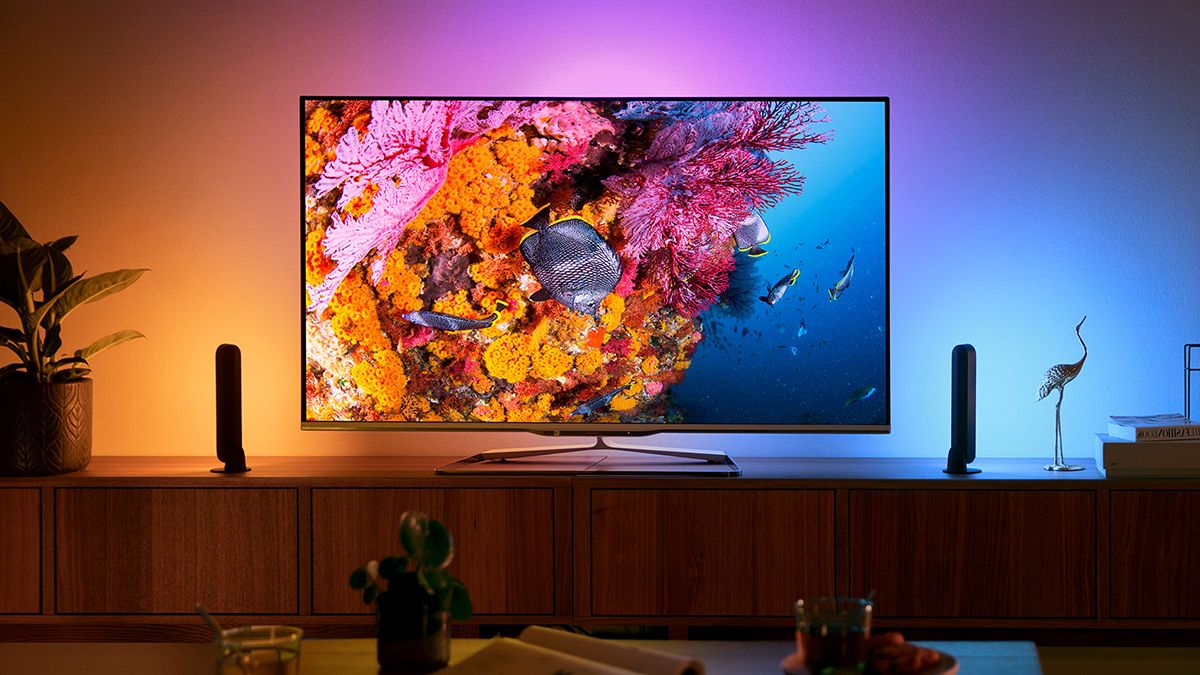
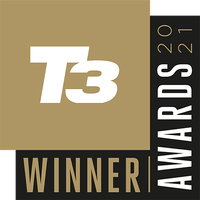
The most comprehensive smart light range out there, covering bulbs, lamps, and strip lighting to suit almost every need. The polished app and wide range of third-party integrations add to the appeal too.
-
+
Good choice of white and colour bulbs
-
+
Easy setup and configuration
-
+
Works with multiple smart home standards
-
-
Can be pricey
-
-
Hue Labs needs some work
Why you can trust T3
Welcome to T3's Philips Hue review and guide, perfect for weighing up whether this is the smart light system for you in the run-up to the best Black Friday deals, where we are expecting some big discounts across the Hue range.
If you're shopping for the best smart lights then Philips Hue is one of the biggest names in the business, with the brand going from strength to strength – so much so, that the Hue range has just won Best Smart Lighting at the T3 Awards 2021 once again.
Here we'll lay out exactly what the Philips Hue smart light range includes, how it works, and whether it's worth your while to invest in. Read on to discover everything you need to know about the smart lighting system from Philips Hue parent company Signify, and what we think of the hardware.
Philips Hue: overview
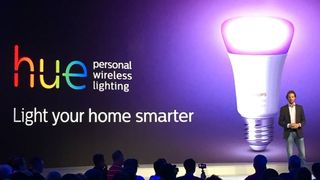
If you're new to the idea of smart lights, they come as standalone lamps or as bulbs you fit to your existing lighting fixtures. They'll work with regular light switches, turning on and off as normal – though typically not with dimmer switches – but because they're connected to Wi-Fi you can control them with an app as well.
That means with a tap on your phone or tablet you can have lights going on or off, or shifting in their colour and brightness. From those foundations you can go further, grouping lights together, setting them on a schedule, and even having them turn on as you enter the house.
The Philips Hue smart lights can do all of this and more. The bulb and lamp selection is extensive, the lights are simple to set up and operate, and you get plenty of advanced options and integrations to play around with too. It's the smart light system that keeps on giving.
We'll discuss specific models below, but the standard bulbs give off the equivalent of a 60W standard incandescent bulb at full brightness while drawing just 10W of power (thanks to LED), and Signify says they're guaranteed to last for 10 years at least.
We should also mention integrations – Hue lights work with Amazon Alexa, Google Assistant, Apple HomeKit and Samsung SmartThings. Whatever overarching system you've chosen for your smart home, Philips Hue is going to fit in with it, which is another point in its favour and another of the reasons it's one of the leading names in the business.
Philips Hue goes Bluetooth
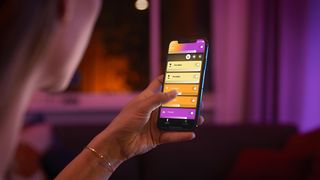
We've discussed the bulbs that make up the main Philips Hue range below, but the most recent lights released under the brand name are different from all the ones that have gone before: they can be accessed via Bluetooth as well as Wi-Fi.
That means for the first time you've got a Hue bulb that doesn't need a Hue Bridge to work (though the Bridge does give access to extra features, like plugging in third-party apps and controlling your lights while you're away from home.
For the time being, only the A19 traditional bulb and BR30 downlight are available in Bluetooth-ready form, and only in the US. Signify says more Bluetooth bulbs will be added and become available in more regions through 2019 and 2020.
Philips Hue: bulbs and accessories
Part of the appeal of the Philips Hue range is the sheer number of products to pick from. A good start is one of the aptly named Starter Kits, kits which come with a selection of bulbs and a Hue Bridge to connect to your router.
There's also now a growing range of Philips Hue Outdoor lights, which we also have a handy buying guide for.
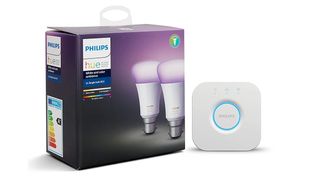
You can get these Starter Kits with colour B22 bayonet bulbs, for example, or with white E27 screw bulbs, or with colour GU10 spotlight bulbs and a dimmer switch. Take your pick depending on the lamps and lights you need, and how much you want to spend up front.
The Philips Hue Bridge can also be picked up independently without bulbs, if needed, giving you the flexibility to pick and choose the light fittings you want with it. Other Philips Hue accessories you can get include the Dimmer Switch we've already mentioned, the standalone Smart Tap remote control, and the official Hue Motion Sensor.
With your Hue Bridge and choice of accessories in place, you can add bulbs and sets of bulbs as needed. Available models include the E27 screw, B22 bayonet, and GU10 spotlight bulbs, all with white light and coloured light options. For smaller fittings, white and coloured E14 screw bulbs are also available.
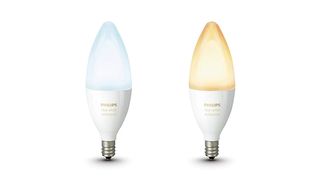
And no, that's not all: You can also buy Philips Hue LightStrips as well as standalone lamps like the Hue Go, the Hue Play Colour, and the Hue Bloom. Outdoor options include the Philips Hue Lucca. All these lights connect to the Hue Bridge, and can be controlled through the Hue app and anything else you've connected the lights to.
Philips Hue: setup and installation
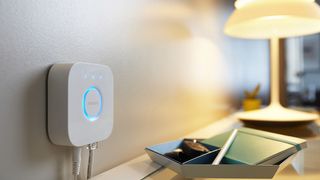
As we've already intimated, the Hue Bridge is the centre of your Hue world. It plugs directly into your router via an Ethernet cable, and then creates its own Zigbee-compatible wireless network to communicate with up to 50 different bulbs.
The Hue Bridge may seem superfluous considering rival Lifx connects its bulbs straight to your Wi-Fi, but if you think about how many gadgets are already trying to ping your router, there's some sense in creating a separate network. It all depends how many smart bulbs you want to install, and how much you want to spend.
Setting up the Hue Bridge takes minutes and can be done by anyone, no matter their level of expertise: everything is handled through the app for Android or iOS, and that's how you add bulbs as well. The app scans for them, you push the button on the Hue Bridge, and hey presto – there's a new smart light on the network.
Adding extras to the main network, like Google Assistant or Alexa integration, or a motion sensor, is easily done too – it only takes a few minutes in each case, and again the apps involved guide you step-by-step through the process.
Living with Philips Hue
There are reasons why Philips Hue has become such a big name in smart lighting – the system is slick, reliable and responsive, and you're bound to be impressed with what's possible once you've got a few Hue bulbs set up.
Using the app is a breeze, especially since the major 2018 overhaul that smoothed off a lot of the rough edges and fixed a few outstanding bugs – like the way lights would come back on at full brightness after a power cut. That no longer happens.
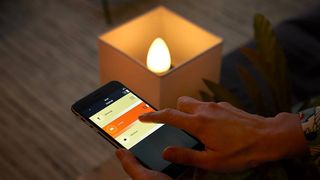
Fire up the app and you can have yourself a whole load of fun playing around with timings, brightness and colours, and the way that the Hue app lets you group bulbs and lamps together is intuitive too. Whether you're a smart home pro or a smart home newbie, you can use the Philips Hue system.
The one area where the app does stumble is in the Hue Labs section, where Signify tests out experimental ideas – at the time of writing they include gently fading up lights to match the sunrise, cycling through preset colours automatically, and turning lights on and off at random times (to try and trick potential burglars).
These Labs features are a bit more fiddly to control and confusing to configure, but you'll get there in the end. We'd just like to see more of them added to the app proper rather than kept in a separate part of the app, as they're all very useful.
For those of you with homes stacked with smart gadgets, the Google Assistant and Amazon Alexa integrations are fantastic: you can still use the Hue app, but you can also use these digital assistants to group smart lights from different manufacturers together, and to turn bulbs (or entire rooms) on or off with a voice command. All of this works whether you're at home or on the other side of the world, too.

You can set up scenes to help you concentrate, read, or find your way to the bathroom at night; you can have your bulbs turn on automatically in the morning or turn off after a set period in the evening; and there's even an official Hue app for syncing lights with your movies or video games.
The simple stuff is easy to do, and then the advanced stuff – timers, groupings, automation – is there if you need it. Aside from adding some of the Hue Labs features to the main app, it's hard to see how the Philips Hue system could get much better.
Philips Hue: verdict

We've been enthusiastically talking up the benefits and appeal of the Philips Hue lighting system in this review, so it's only fair to talk about a few drawbacks. One is price – if you just want the basics and don't want to spend much, the Ikea Trådfri system might be a better bet for you.
Lifx is the main rival to Philips Hue, as we've noted above. These bulbs cost quite a bit too, but you don't need a Hue Bridge to operate them – they link straight to your router. Lifx might be worth considering if you only want to get a handful of bulbs set up.
In terms of comprehensiveness and feature set though, it's hard to look beyond what Philips Hue offers you – there's a wide choice of bulbs, lamps and fittings to meet most scenarios, they're easy to set up and configure, and work exactly as advertised through the app. The numerous third-party integrations are welcome bonuses too.
Philips Hue isn't the right choice for everyone when it comes to smart lights, but at the moment it is the standard bearer for what a fully fledged smart lighting system can be – how much use and fun you can get out of devices like these. We're looking forward to seeing what Philips Hue does next.
Sign up to the T3 newsletter for smarter living straight to your inbox
Get all the latest news, reviews, deals and buying guides on gorgeous tech, home and active products from the T3 experts
Dave has over 20 years' experience in the tech journalism industry, covering hardware and software across mobile, computing, smart home, home entertainment, wearables, gaming and the web – you can find his writing online, in print, and even in the occasional scientific paper, across major tech titles like T3, TechRadar, Gizmodo and Wired. Outside of work, he enjoys long walks in the countryside, skiing down mountains, watching football matches (as long as his team is winning) and keeping up with the latest movies.
-
 TAG Heuer upgrades its iconic Formula 1 watch with Solargraph movement and nine colourways
TAG Heuer upgrades its iconic Formula 1 watch with Solargraph movement and nine colourwaysTAG Heuer revamps its Formula 1 collections at Watches and Wonders
By Bethan Girdler-Maslen Published
-
 You don’t need the gym – build boulder shoulders with this dumbbell-only workout
You don’t need the gym – build boulder shoulders with this dumbbell-only workoutYou’ll have delts for days after doing these five exercises
By Bryony Firth-Bernard Published
-
 New Nomos Club Sport Neomatik Worldtimer is unbelievably slim
New Nomos Club Sport Neomatik Worldtimer is unbelievably slimMy favourite watch just got even better
By Sam Cross Published


